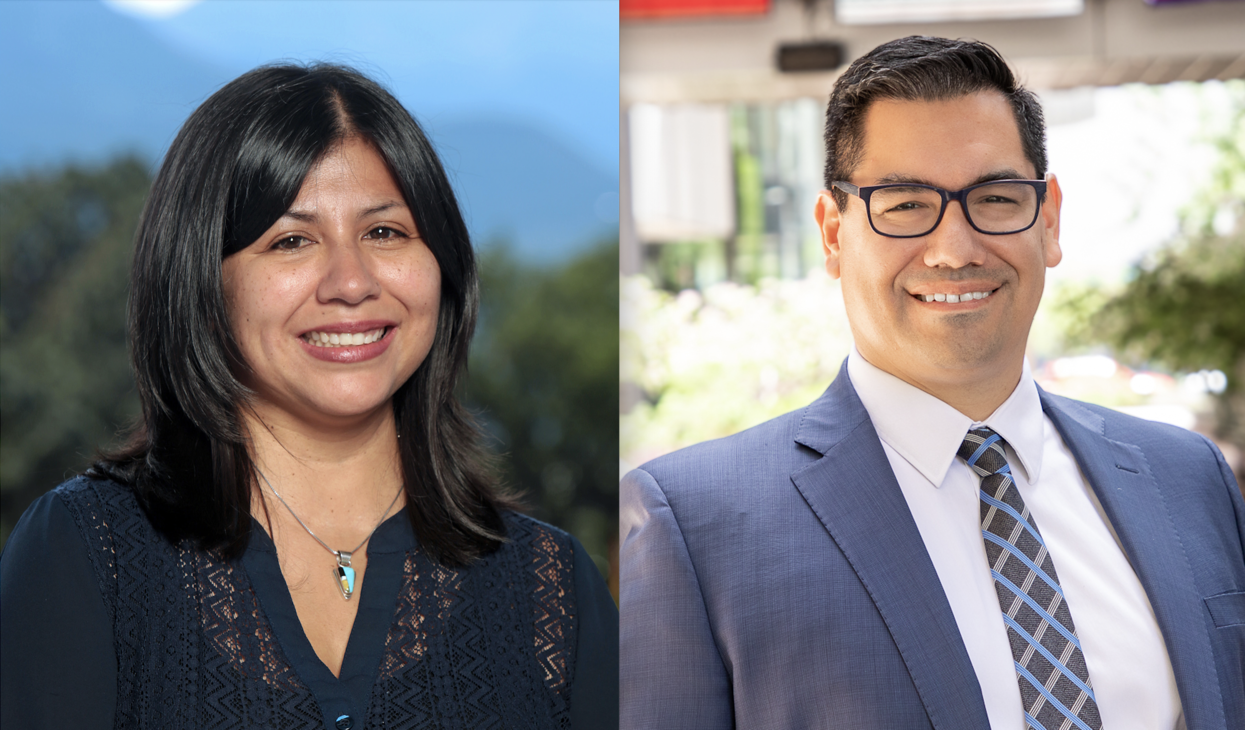Unsettling Sound Technologies: Indigenous Sonic Sovereignty and Border Politics

A History & Theory of New Media Lecture, presented as part of BCNM's Indigenous Technologies initiative, and co-sponsored by Department of Ethnic Studies and the Department of Art Practice
with Christina Leza, Professor of Anthropology and Indigenous Studies, Colorado College, and Trevor Reed, Professor of Law, Sandra Day O'Connor College of Law, Arizona State University
Moderated by Sierra Edd, Indigenous Technologies Coordinator
The U.S.-Mexico border symbolizes both the colonized state of Indigenous territories in the U.S.-Mexico borderlands and the border identities of this region’s Indigenous peoples. Drawing from ethnographic fieldwork and close analysis of language and sound in the music of two Indigenous hip hop groups—Shining Soul and Anahuac Underground—Christina Leza addresses identity negotiation and ethnic alliance-building for Indigenous hip hop artists producing music as decolonial and racial justice movement. She explores contemporary “soul” as a mode of interethnic communication and survival emerging from colonized struggles and from Indigenous struggles to (re)claim Indigenous identities and lifeways.
Sound preservation technologies are typically viewed by settler institutions as an integral part of preserving Indigenous culture, and in so doing, supporting Tribal sovereignty and self-determination. However, the impetus to document and preserve Native culture by settler institutions has led to some staggering realities. Currently, hundreds of thousands of Indigenous voices remain incarcerated in museums, universities, archives, and government agencies, beyond the jurisdictional border of Indigenous communities’ sovereign power, as understood by the American settler-state. In the age of Big Data and AI, these voices can now be transformed and mobilized to support all manner of institutional or personal goals—goals that may conflict with Indigenous laws, protocols, and standards of care. Trevor Reed draws on ethnographic work conducted in partnership with Tribal Nations in the U.S. Southwest and research on current developments in cultural preservation and data privacy law to support the legal recognition of an Indigenous community’s right to care for, reclaim, or in some cases erase or destroy preserved Indigenous voices currently in the hands of the settler institutions.
Professors Leza and Reed will be in conversation, moderated by Sierra Edd, coordinator of BCNM's Indigenous Technologies initiative.
About Christina Leza
Christina Leza is Associate Professor of Anthropology and Indigenous Studies at Colorado College. She is a linguistic anthropologist and Yoeme-Chicana activist scholar whose scholarship focuses on Indigenous rights and lifeways, grassroots social justice movement, social discourse about race and ethnicity, and the U.S.-Mexico border region. Her publications include "Hip Hop is Resistance: Indigeneity on the U.S.-Mexico Border" in Music and Modernity among First Peoples of North America (Wesleyan University Press) and her ethnography Divided Peoples: Policy, Activism and Indigenous Identities on the U.S.-Mexico Border (University of Arizona Press). Her work has appeared in scholarly journals and media outlets including Semiotica, Wicazo Sa Review, Journal of the Southwest, The Conversation, Yes! Magazine, NPR, and PBS News Weekend. She is currently writing a textbook about the linguistics of racism titled The Language of Racism and Antiracism (Routledge) and is co-editor of the forthcoming second edition of The Everyday Language of White Racism by Jane H. Hill (Wiley) with Jacqueline Messing and Barbra Meek.
About Trevor Reed
Dr. Trevor Reed is a Professor of Law in the Sandra Day O'Connor College of Law at Arizona State University, where he teaches courses in Property, Intellectual Property, and Federal Indian Law. Dr. Reed’s research broadly explores the social impacts of intellectual property law on individuals and their communities. His current scholarship focuses on the linkages between creative production and Native American sovereignty. His recent publications include Restorative Justice for Indigenous Culture (UCLA Law Review), Fair Use as Cultural Appropriation (California Law Review), and Indigenous Dignity and the Right to be Forgotten (BYU Law review), with Sovereign Aesthetics, a new edited volume, forthcoming next year with Duke University Press (with Jessica Bissett-Perea). Dr. Reed is currently advancing community-partnered projects to assist Indigenous peoples as they protect and promote their cultural heritage, traditional knowledge, traditional cultural expressions, and intellectual properties by strategically drawing on tribal, federal, and international law.
Indigenous Technologies
Indigenous Technologies is a program of the Berkeley Center for New Media that engages questions of technology and new media in relation to global structures of indigeneity, settler colonialism, and genocide in the 21st century. Our Indigenous Tech events and ongoing conversations with Indigenous scholars and communities aim to critically envision and reimagine what a more just and sustainable technological future can look like. We will highlight Indigenous engagements with robotics, computer science, telecommunications, artificial intelligence, virtual reality, social media, online activism, video games, and more.
Read a full description of the program and find more resources here.
More Info
Click here for the full 2023-24 History and Theory of New Media season.
Click here for the full 2023-24 Indigenous Technologies season.
Accessibility
The event is free and open to the public and will take place virtually over Zoom with a simultaneous livestream on BCNM’s YouTube Channel. All of our broadcasts will be live-captioned, and our Zoom Webinar experience offers an additional Streamtext window with options to customize caption text size and display. Please contact info.bcnm [at] berkeley.edu with requests or questions.
With the consent of featured speakers, all recorded videos will be available on the BCNM YouTube channel immediately after the event and event transcripts will be posted to this page one month after the event. We strive to meet any additional access and accommodation needs.
BCNM is proud to make conversations with leading scholars, artists, and technologists freely available to the public. Please help us continue this tradition by making a tax-deductible donation today. If you are in the position to support the program, we suggest $5 per event, or $100 a year.
